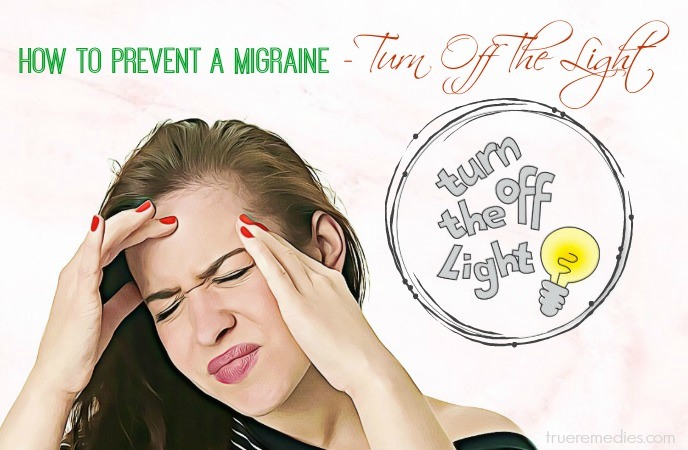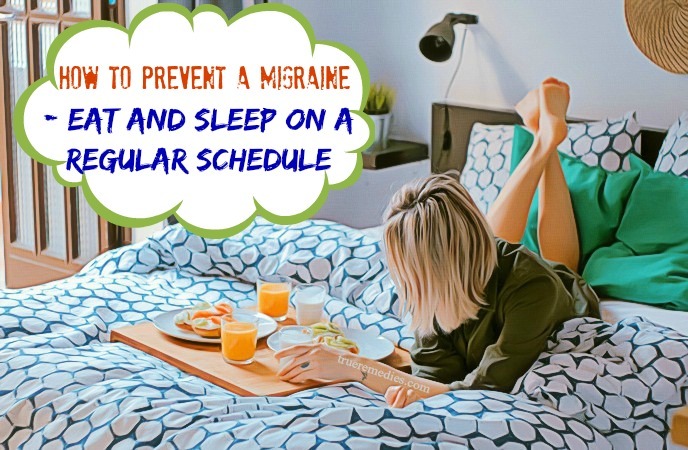Updated: 11/14/2019
Contents
Fever, flu, sinusitis, stress and tension can all irritate the head, causing pain in the head. Migraine is another pain. Doctors describe migraine as a recurrent headache associated with symptoms such as dizziness, visual disturbance, facial or limb pruritus, and nausea. Migraine can make the patients feel very tired and uncomfortable. Suffering from a migraine is a terrible experience. However, do not worry too much about this because this article can help you prevent this. But first, let's take a look at basic information about migraine. As a result, you can accurately determine your problem.
What Is A Migraine?
Migraine is a condition in which one side of the head suddenly aches. Migraine can last from several hours to several days. Migraine is a kind of neurological disease and affects your ability to work and your daily life if not treated promptly. Treatment of this disease is to reduce symptoms and prevent recurrent pain. It is usually benign, however, when the pain is coming, you will feel very uncomfortable and your daily activities will be disturbed. Migraine is more dangerous than we think. The World Health Organization (WTO) has also listed migraine headaches in the top 20 most deadly diseases which are likely to cause severe injury to the patient. For women, this is a far greater danger. There are many cases of people who, after experiencing migraine, have suffered from permanent damage to the brain, paralysis, or even death.
Previously, doctors thought that the expansion and contraction of blood vessels around the brain is the main cause of migraine, so the drugs used to treat this condition are primarily focused on this reason. Later, however, scientists discovered another cause of migraine, which involved in the neurotransmitter system and brain chemicals. At present, migraine is clearly distinguished from other forms of headache; it is separated into a separate disease. Migraine tends to develop into chronic disease.
What Are Common Causes Of A Migraine?
Serotonin is a neurotransmitter that is responsible for maintaining emotional and mental stability. This means that it affects the sensation, temperament, sleep, sexual behavior, digestion and blood vessel elasticity. All scientific studies confirm that serotonin is a direct intermediate that triggers migraine attacks. Specifically, if serotonin levels in the blood suddenly rise and then break down in the blood, it will cause the vessel wall to expand suddenly. This affects the pain receptors inside and outside the skull, leading to migraine.
The following are the specific causes of this condition:
TrueRemedies Partner Solutions

Need a Help from the Leading Expert Online, Available 24/7?
They’re all here and ready to answer your questions online or by phone. Keep asking questions until you get the answer you need.
- Psychological Influence
One of the most common causes of migraine headaches in modern life is stress. Not only does it cause migraine headaches, stress also causes many other dangerous conditions, such as anorexia, insomnia and stomach pain. In addition, insomnia or sleep disturbance is also one of the causes of headaches and migraine. Lack of sleep and stress will directly stimulate the nerves, affecting the blood circulation. This psychological condition causes the blood vessels to dilate excessively, resulting in the formation of factors that affect the blood vessels and cause severe pain.
- Hormonal Changes
This is a factor that can be used to explain why women suffer from migraine three times as many as men [1]. Hormonal changes in the body are the reason why women often have a migraine before or after the menstrual cycle. Another explanation suggests that hormonal changes affect serotonin levels in the blood which is a leading cause of migraine. Therefore, this is also one of the causes of common migraine.
- Change Of Weather
By observing a lot of cases of migraine, we can see that weather change is one of the causes of migraines. As the weather changes, many people complain that their migraines usually appear more with greater intensity. Factors that trigger migraine include abnormal fluctuations in temperature, changes in humidity or pressure. However, the factors that cause migraine due to weather are often difficult to control and prevent.
- Foods
When you have migraine, you should be very careful about your diet. Dieting, eating foods that contain stimulants such as chocolate, cheese, pasta, or drinking alcoholic or caffeinated beverages such as alcohol and coffee make your condition worse. These foods increase the risk of migraine headaches because stimulants such as caffeine or alcohol can stimulate the nerves, causing the nerves to tighten up and increasing blood flow. This makes you immediately fall into the migraine.
- Misuse Of Medication
Taking medicine is one of the most sensitive factors in treating the disease. Medications can cure or relieve pain but they can also cause pain syndrome. You really need to pay attention to the dosage of pain relievers commonly used, such as Aspirin and Paracetamol, as well as the contraindications of these drugs to users. Some other drugs also cause pain such as vasodilator, Nitroglycerin, some hormonal medications, especially oral contraceptives.
What Are Common Symptoms Of Migraine?
When you have migraines, you will encounter some signs which foretell the appearance of migraines for hours or days afterwards. They are:
- Changes in mood like sudden depression or irritation
- Sensitivity to light
- Sensitive to sound
- Weariness
- Change the taste and nausea
Then, you will experience a temporary sensory or movement disorder before the migraine. These signs include hearing as well as visual problems. This usually lasts 10 to 30 minutes, and then the migraine will appear. You may also feel nauseous and tired.
You may experience other symptoms not mentioned. If you have any questions about the signs of the disease, please consult your doctor.
Who Is At High Risk Of This Disease?
Everyone is susceptible to this disease. However, the disease is more common in people between the ages of 10 and 45 years, in which women are at higher risk than men.You can control this problem by minimizing risk factors. Please see your doctor for more information.
When To See A Doctor?
You should see a doctor if:
- You are over 50 years old
- Your migraine is worse than usual
- You often have a sudden migraine
- The drugs you often use do not work
- You have a high fever
- You have severe nausea
- Stiff neck
- You have trouble in speaking
- Occurrence of epilepsy
- The eyesight is reduced
If you have any of these signs or symptoms or have any questions, please consult your doctor. Each person's condition is different, so please consult your doctor to select the most suitable option.
The above information is about a migraine. You should know this information as it helps you to accurately determine your skin condition as well as identify appropriate measures to improve it. Below, we provide you tips on how to prevent a migraine attack from happening, getting worse and coming back. Take a look at TrueRemedies.com!
Top 28 Tips On How To Prevent A Migraine Attack From Happening
1. Turn Off The Light
Turning off the light is the first home remedy in this list of tips on how to prevent a migraine attack. Many migraines are caused by sensory stimulation, such as flashing lights. As soon as the symptoms of migraine are imminent, you can soothe the senses by turning off the lights and pulling the lamp down or moving into a dark room. This will help you prevent a migraine. Even if you are suffering from migraines, you can also do these things. Staying in the dark room until the migraine is resolved or as long as possible is what you should do. Also, wear sunglasses when necessary. If you have to go out and cannot find a place with soft lighting or where there is no light, you should wear polarized sunglasses to protect your eyes from the brightest part of the light spectrum. This is not as effective as staying in the dark room for a few minutes, but it is often helpful.
2. Avoid The Noise
This is another must-try treatment in this list of tips on how to prevent a migraine attack. Similar to light, sound is also another sensory stimulus, so it may be the cause of your migraine. When you feel unwell, turn off all the sound that is being output, such as radio or TV, or move to a quiet place. If you cannot get into your room, you should wear headphones over your ear to block out the noise. Some people find stressful or uncomfortable when quiet. In that case, you should open the air purifier to create gentle ambient sound. In addition, you can listen to light music, but avoid the melody which is too loud or too exciting.
3. Lie Down And Rest
This remedy is one of little – known tips on how to prevent a migraine attack. Stress and lack of sleep are two other triggers for migraine. You should take a few minutes to lie down and close your eyes every time a migraine is about to occur or whenever they hurt you. Rest anywhere about 5-30 minutes to help alleviate migraine headaches. However, note that some migraines are caused by too much sleep. If sleep is a stimulant, you should not lie too much.
4. Deep Breath
The next treatment in this list of tips on how to prevent a migraine attack is deep breathing. Deep breathing exercises can help the body relax, thereby relieving stress which is a cause of a migraine. To do this, please follow these following steps:
- Lie on your back, put pillows under your head and another pillow under your knees. The legs should be slightly curved.
- Place your hands on your upper chest and your other hand on your chest.
- Breathe in the nose until the belly is stretched and pushed forward.
- Exhale slowly with your mouth while rubbing your belly.
- Keep your hands in place throughout the entire exercise.
- Carry out deep breathing exercises for 5 minutes.
You should do this exercise in your spare time to prevent migraines or support the treatment.
5. Cold Compress
This sounds strange when cold compress comes to tips on how to prevent a migraine attack, but it works. Applying a cold towel on the head can cause the blood vessels to contract, thereby slowing blood flow to the head. To do this, please follow these following steps:
- Dip a soft towel into the cold water and apply on the forehead or neck for 10-15 minutes.
- Stop doing this for 10-15 minutes, then continue to apply cold towel again.
- Do this until the migraine gets better.
However, note that in some cases, cold temperatures can cause severe migraines. If the pain increases in the first 5 minutes, you should stop immediately and try another way. You should not use ice cubes to do this because they make your head or neck feel too cold. This will only make you feel uncomfortable.
You can also apply warm compresses by dipping a soft towel into warm water and doing the same as above. This also has the same effect.
6. Take A Cold Shower
Stand under the shower so that water can flow from the top of your head for at least 15 minutes. Massage head while shampooing. This helps the body relax, while stimulating the heat from the scalp. Then, gently dry your head. You should not use a dryer to do this. When your hair is dry, lie in a cool room and try to sleep for a while. Sure then you will notice your condition is a lot better.
7. Take An Over-The-Counter Pain Reliever
As soon as the pain appears, there are many ways you can do to reduce the severity of it, including taking an over-the-counter pain reliever. Acetaminophen or over-the-counter Ibuprofen can help to relief migraine in some cases. However, you need to know that these medicines can damage the liver and kidneys if used for long periods of time. The dosage of Ibuprofen and Acetaminophen are indicated on the bottle. Do not use over recommended dose on the bottle. Talk to your doctor to make sure there is no interaction with other medications you are taking or with your underlying illness. Overdose may be life-threatening, causing damage to the liver or kidneys. If you take your medication overdose, you need to seek emergency medical care immediately.
8. Talk To Your Doctor About Prescription Medications That Help Prevent Migraines
This is the next one in this list of tips on how to prevent a migraine attack. Your doctor may prescribe preventive medicine to reduce the frequency and severity of migraines. There are several different preventive medications that can be taken daily. They are:
- Beta blockers. They are often used to treat heart disease. Although doctors have not yet been able to explain clearly why this type of drug works to prevent migraines, it is still very useful for this condition. Many doctors believe it helps to prevent blood vessels from contracting and dilating in the brain. Beta blockers include Atenolol (Tenormin), Metoprolol (Lopressor), and Propranolol (Inderal).
- Calcium channel blockers. They are another medication that helps treat heart disease. They are used to reduce the frequency and duration of migraine. Calcium channel blockers include Verapamil (Calan) and Diltiazem (Cardizem).
- Tricyclic antidepressants. They help prevent migraines and other headaches. This type of medicine includes Amitriptyline (Elavil), Nortriptyline (Pamelor), Doxepin (Sinequan), and Imipramine (Tofranil).
- Some anticonvulsants. Although it is not possible to clearly explain the reasons for this method, doctors have found that some anticonvulsants also help prevent migraines. Some anticonvulsants that help prevent effective migraines include Divalproex sodium (Depakote), Gabapentin (Neurontin), and Topiramate (Topamax).
- Botox injection. This method is also approved by the Food and Drug Administration (FDA) for the treatment of migraine. If this method is used, you need to do it every 3 months.
9. Talk To Your Doctor About Acute Medications Or Abortion Pills
No wonder, this is definitely one that should be mentioned in this list of tips on how to prevent a migraine attack. Acute medications or abortion pill are designed to prevent migraine. These medications are taken when the first symptoms of migraine appear. They are:
- Triptan class drugs. Triptan is the first class of drugs prescribed to relieve pain, nausea, and sensitivity to light, sound, and odor. The Triptan class drugs include Almotriptan (Axert), Eletriptan (Relpax), Frovatriptan (Frova), Naratriptan (Amerge), Rizatriptan (Maxalt), Sumatriptan (Imitrex), and Zolmitriptan (Zomig).
- Ergot class drugs. This is the second class of drugs used to relieve pain and related symptoms (symptoms may be worse than migraines). These drugs can contract blood vessels, reducing blood flow to the brain. However, they can causes some side effects. They are Ergot includes Dihydroergotamine (Migranal) and Ergotamine (Ergomar).
- Midrin class drugs. Isometheptene, Dichloralphenazone and Acetaminophen are called Midrin, a combination of painkillers, sedatives and medications. These drugs can tighten blood vessels, thereby helping to relieve the symptoms of migraine.
- Narcotic class drugs, such as Codeine. These drugs are usually given to people who cannot take Triptan or Ergot because of these side effects. Keep in mind that the Narcotic pill can make you dependent on it and can also cause sudden headaches to recur.
10. Keep A Headache Diary
One of the most overlooked tips on how to prevent migraine beforehand is keeping a headache diary. By doing so, you could easily pinpoint your particular migraine triggers. Some examples of what you should note about:
- What you eat and drink
- Your daily schedule
- The weather
- Your emotions and feelings you might have
- your medications and their secondary effects
- severity and times of your migraines
This will help you get the pattern of your migraine occurrence, making the avoidance easier.
11. Track Your Migraine Triggers
How to prevent migraine at the beginning? You need to understand your migraine triggers. Treating migraines is individualized as everyone has a different state and experience with treatments and triggers. Via symptom tracking, the suffer will record when the pain attacked, how severe and intense it was, and what involved symptoms are. By tracking pain, you can identify an overall pattern related, like hormones.
12. Beware Of Your Hormonal Changes
Hormones play an important role when it comes to how to prevent migraine. A lot of women tend to experience more frequent episodes of migraine headaches before or during their menstrual period. Thus, women ought to be particularly vigilant with their current exercise and diet habits during this period. This will relieve symptoms before they start. In accordance with the Mayo Clinic, hormone replacement therapy (HRT) and oral contraceptives might increase the severity and frequency of migraines. Some women might find a balance of their hormones when they use another form of birth control or taking birth control pills.
13. Beware Of The Weather
It was shown that the potential risk of having a severe migraine increased up 7.5% for every 50C rise in the temperature, according to a Harvard Gazette’s report. Also, migraine sufferers are also 1/3 more likely to suffer from migraine or headache on days with lighting strikes within about 25 miles of their house.
In fact, changes in weather could affect your migraine patterns. The hot temperatures and high humidity could increase headaches. The same goes for rainy days. If you feel uncomfortable due to the weather, you should stay indoors. Stay in air-conditioning during the heat waves. If a storm is coming, you had better keep your other migraine triggers to the minimal level. Obviously, you could not always avoid going outdoors, yet you can always minimize the time spent in the weather inducing headache.
14. Eat And Sleep On A Regular Schedule
Skipping meals or fasting could trigger migraine headaches. Thus, you should eat within 1 hour of waking up and every 3-4 hours then. Dehydration and hunger are triggers of migraine. Thus, you should drink enough water and avoid skipping meals. Moreover, fasting or skipping meals also increase your blood glucose levels, leading to migraines.
Lack of sleep, on the other hand, aggravates your symptoms, so you should sleep at least 7-8 hours per day. However, getting too much sleep could also cause headaches, so do not snooze too long [2].
15. Use Essential Oils For Migraines
To know how to prevent a migraine before it starts, you can consider using essential oils. Experts recommend using lavender essential oil as it not only smells great but also is a great home remedy for migraine and headache pain. You can either inhale or apply lavender oil topically. 2-4 drops to 3 cups of boiling water are enough to make the inhaling lavender oil vapors for migraine treatment.
Other useful essential oils include peppermint, eucalyptus, frankincense, and rosemary.
16. Do A DIY Scalp Massage
To prevent a migraine, a scalp massage is beneficial. Basically, essential oils are the base for massages thanks to some reasons. It reduces friction on skin during the massage, so the massage will be less painful. During scalp massages, essential oils are used for releasing the calming scents into the air. This is aromatherapy. Some highly recommended oils are lavender, rosemary, and chamomile.
When choosing oils, go for the high-quality products. If you use substandard oils, it just releases more toxins into your body instead of removing. You need to use carrier oils like jojoba, olive, coconut oil to dilute the essential oils prior to using on skin. It will prevent irritation.
After preparing the oils for massaging, you give a scalp massage by applying the oil to your shoulders and neck first and let the aromatherapy work.
Lay on your back with your head supported in the hand. Use your other hand’s fingers to run from the collar bone to the ear. First, use the light pressure and steadily increasing it with every stroke. Do the same on the side of your neck and back. Make circular motions using your fingertips around the scalp surrounding your hairline.
During massage, use stretching to increase the benefits. With your fingers of two hands, you pull back gently from the bottom neck base to the scalp base along your hairline. Give some light pressure to that area while gently pulling your head away from your body. This will help to relieve the tension, so the migraine does.
Despite a scalp massage could be an efficient way to prevent tension headaches and migraines, it is not a good idea to give a person already having a migraine a scalp massage because it just worsens the pain. Also, remember to drink plenty of water prior to the session so that the toxins could be relieved more quickly.
17. Use Acupuncture
This is an ancient healing tip to help alleviate the pain associated with migraines and prevent future episodes from happening. You had better find a qualified acupuncturist to do it for you and to understand how it could help with your problem.
18. Practice Relaxing Exercises
A healthy lifestyle cannot be completed without regular exercise. Yet, intense ones like weight lifting might trigger migraines. Thus, upon exercising, you need to pay extra attention to your own body’s response to certain activities. Choose the activities which reduce stress without putting further strain on your body, like tai chi, light aerobics or yoga.
19. Lose Weight
Women having much belly fat are 37% more likely to suffer from migraines than those with flat belly, in accordance with the 2009 study at Drexel University College of Medicine. In such case, losing pounds can make a big difference in migraine prevention.
20. Control Your Allergies
It is estimated that about ¼ people having allergies also suffer from migraines, according to the American Headache Society. The bodies of people with allergic reaction release chemicals namely histamine and other substances which may trigger a migraine. Thus, it is helpful to control your allergy symptoms so that you can reduce the risk of getting migraines.
21. Try Indian Chrysanthemum
Using Indian Chrysanthemum is the next remedy in this list of tips on how to prevent a migraine attack. You may want to consider using Indian chrysanthemum every day to prevent migraines or reduce the severity of this problem. Here are some things you need to keep in mind when using Indian chrysanthemum:
- Freeze dried capsules are recommended because chrysanthemum tea is usually bitter and it can irritate the mucous membranes in the mouth.
- Talk to your doctor and pharmacist before using Indian chrysanthemum daily. Indian chrysanthemum can interact with other medications you are taking.
- Pregnant women, breast-feeding women, and people taking aspirin or Ibuprofen are not allowed to use Indian chrysanthemum.
- If you do not want to drink Indian chrysanthemum tea anymore, you should reduce your intake gradually. Stopping abruptly can cause recurring migraines, accompanied by more symptoms such as nausea and vomiting.
22. Get Enough Sleep
The next treatment in this list of tips on how to prevent a migraine attack is getting enough sleep. Hormonal change is one of the triggers for migraine. The body produces and secretes hormones like melatonin and cortisol based on the number of hours you sleep and when you go to bed. This hormone change along with sleep deprivation causes migraines. Therefore, try to go to sleep before 11pm and be sure to sleep at least 8 hours a day to prevent migraines.
23. Limit Consumption Of Alcohol And Caffeine
This is another must-try treatment in this list of tips on how to prevent a migraine attack. Alcohol and caffeine affect the nervous system. Although the exact cause of migraine has not yet been determined, most doctors believe that changes in the nervous system can trigger migraines. Small amounts of caffeine can increase the effectiveness of acetaminophen when the migraine has just begun. Usually, drinking a cup of coffee when taking Acetaminophen is enough. Conversely, if you drink too much (more than 2 cups), migraines may recur.
24. Plan A Migraine Diet
Diet plays an important role in preventing migraines and headaches. There are pain-safe foods that do not contribute headaches as well as other painful conditions. They are:
- Cooked green veggies, like Swiss chard, collards, broccoli, and spinach
- Rice (brown rice)
- Cooked yellow veggies like summer squash
- Cooked orange veggies like sweet potatoes or carrots
- Plain water
- Condiments like maple syrup, salt, vanilla extract
- Dried or cooked non-citrus fruits like pears, cherries, cranberries and prunes (not citrus fruits like apples, bananas, tomatoes, peaches)
On the other hand, you ought to avoid some common triggers which often cause migraines in susceptible people [3] [4]. Some common food triggers are:
- Chocolate
- Dairy products
- Eggs
- Citrus fruits
- Tomatoes
- Meat
- Wheat (pasta, bread, etc.)
- Onions
- Corn
- Bananas
- Apples
- Peanuts and nuts
Some specific drinks and additives are also triggers, including caffeinated drinks, alcoholic beverages, monosodium glutamate, nitrites, and aspartame
The foods that are not on the two lists above ought to be considered possible, yet unlikely, triggers.
25. Manage Stress
Stress can stimulate secretion of hormones that affect the nervous system, thereby stimulating migraines. Each method of stress relief will promote different effects depending on each person, so you need to find the method that suits you. Here are some suggestions:
- Do not let yourself be overwhelmed by tasks that must be completed.
- Take deep breaths. Deep breathing can help lower your heart rate and reduce stress. Talking to yourself positively and optimally also helps relieve stress.
- Exercise regularly. Exercise helps reduce stress, improve mood, and help you feel more confident. You can walk 15 minutes after each meal, go for a swim, take a slow walk in the evening after work, or ride a bike with friends.
- Get enough sleep. Lack of sleep affects not only hormone levels, but also stress. Researchers at the University of Pennsylvania (UCL) found that lack of sleep also increased feelings of sadness, stress, anger and exhaustion. So it is best to sleep 7-8 hours every night.
26. Quit Smoking
The next treatment in this list of tips on how to prevent a migraine attack is quitting smoking. Experts from Michigan Institute of Neurology and Injury (USA) recommend quitting smoking to reduce the frequency and severity of migraines. Tobacco stimulates migraines in three different ways:
- Increases levels of carbon monoxide in the blood and brain
- Reduces oxygen levels in the blood and brain
- Causes toxicity to the brain and liver, reducing the effectiveness of drugs which help prevent migraine.
Therefore, stopping this bad habit is what you should do to prevent migraine.
27. Take Functional Foods Every Day To Prevent Migraines
This is the last remedy in this list of tips on how to prevent a migraine attack. You should talk to your doctor before taking functional foods to prevent migraines. Here are some suggestions for you:
- Magnesium helps prevent migraines in women during menstruation or in people with too low levels of magnesium. Side effects of this functional food include diarrhea and hypotension.
- 5-HTP is the amino acid that turns into serotonin in the body. Some prescription medications for migraine treatment can affect serotonin levels in the body. 5-HTP can help you deal with this situation. However, pregnant women or lactating women should not use 5-HTP.
- Vitamin B2 or riboflavin can help reduce the frequency and severity of migraines. However, do not take vitamin B2 supplements if you are taking Tricyclic antidepressants or anticholinergics drugs.
- Omega-3 fish oils: Supplementing omega-3 fish oil can help reduce the frequency and severity of migraines [5].
- Feverfew: This herb can assist in reducing the frequency of headache and migraine symptoms, including nausea, pain, vomiting and sensitivity to nose and light.
- Melatonin: It can help to boost your sleep quality if used moderately.
- Kudzu extract: This herbal supplement has more than 70 phytochemicals or phytonutrients.
- Capsaicin cream: Using a small amount of capsaicin cream to apply inside your nostril or using capsaicin-containing spray will block nerve pain signals [6] .
- Medicinal mushrooms.
28. Try Mind-Body Practices
Deep breathing, meditation, guided imagery, massage therapy, biofeedback therapy and other techniques for relaxation which link the mind and body are helpful for any kind of migraine pain. They help to decrease muscular tension, boost blood flow, take control of blood pressure, and mange the ability of body to fight stress. You had better take advantage of these practices to check potential signs of clenched muscles in your shoulders, jaw and neck.
There, you have discovered some tips which can help you prevent a migraine. Let’s apply them to see the results that they bring to you. If you have any contributing ideas about our article of “Top 28 Effective Tips On How To Prevent A Migraine Attack From Happening” introduced in How To Category, do not hesitate to drop your words below this post. We will answer as soon as we could.













